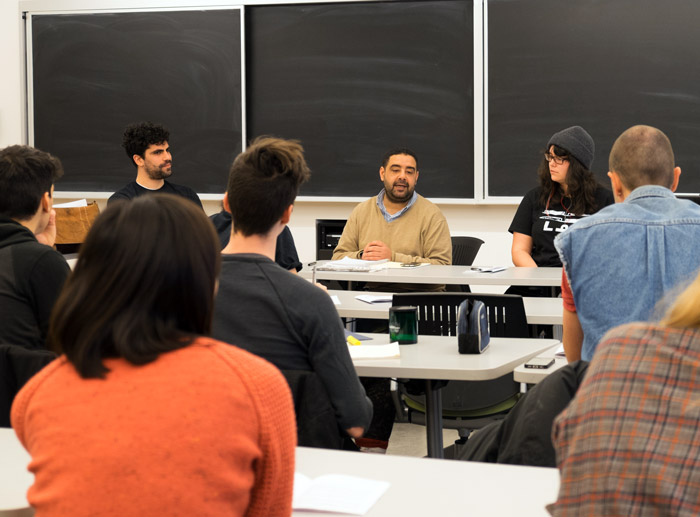As part of the In the Streets & In the Courts—a radical law forum organized by student associations in the Faculty of Law—the Fight for Fifteen panel opened a discussion about raising the minimum wage to $15 an hour by 2018, and improving worker benefits. Panellists Molly Swain, president of the Association of McGill University Support Employees (AMUSE), and Mostafa Henaway, community organizer with the Immigrant Workers Centre in Montreal, addressed the issues that affect casual workers within McGill. Casual workers are employees with irregular and unguaranteed schedules, earning hourly wages without the benefits that workers with permanent positions enjoy.
“Over the past five [or] more years, [we’ve seen] a wave of casualization on campus,” Henaway said. “McGill is taking permanent jobs that are well-paid, very secure, [and] under union protection, and they’re […] breaking them up into casual jobs [.…] People doing the exact same work, on often a part-time basis, will be making literally less than half of the salary that their permanent counterpart was making.”
Swain went on to state AMUSE’s objective and reasoning in spear-heading the Fight for Fifteen campaign, launched by a coalition of McGill labour unions, student organizations and faculty assocations.
“We want to make it less affordable for McGill to hire casual workers,” Swain said. “We don’t think any work that happens on campus, or anywhere, really, is casual work, and we think that everybody deserves to have the same treatment and access to the same resources.”
The Fifteen and Fair campaign aims to raise wages for McGill’s casual workers.
“We’re asking for a $15 minimum for academic work,” said Swain. “We’re asking for benefits for all workers, including […] healthcare, parental leave, as well as access to the Employment Assistance Program […] We’re also asking for library access with a McGill ID card for all employees, tuition discounts for everyone working on campus including students, and also subsidized transportation costs—particularly for people over the age of 26,”
Henaway turned the focus of the discussion to the precarity, or lack of job and wage security, that looms over foreign workers at the Immigrant Workers Centre and in Canada in general.
“The Fight for Fifteen [campaign] is really critical for us because in an age of neoliberalism, precarity has become the norm,” Henaway said. “To fill that need of cheap labour, migration and immigration and immigrant workers have sort of become the pillars of precarity in Quebec and the global north in general.”
Henaway further emphasized the critical role that foreign workers play in society as well as in large corporations’ success.
“If you […] look at where these precarious workers are, they actually hold immense strength in our society,” Henaway said. “They […] work as a key of not just the economy in Montreal, but of the global economy; they make things move for the Wal-Marts, the Dollaramas, the Sears.”
Swain and Henaway concluded the panel by answering questions and encouraging the audience to join the Fight for Fifteen movement. One student who attended, Gabe Hoogers, L2 Law, commended the panel and the speakers’ work.
“There were two very important perspectives from organizers,” Hoogers said. “[Swain] is organizing directly at McGill, organizing the workers who are in a worse position than any university workers […] in Montreal. [Henaway] is organizing foreign and temporary workers, people who are in serious situations of precarity. I think that they both provided different, important perspectives on how to get people who are working in precarious situations to work together for that movement.”








